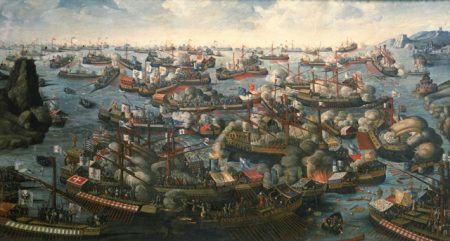Sometimes you find yourself against the wall. Try as you may, circumstances appear too threatening to face. You read Scripture for encouragement and recognize that it’s not a playground, but rather a battlefield in which you rise to greet each new day, a fact that is confirmed by news headlines. “For our struggle is not against flesh and blood, but against the rulers, against the authorities, against the powers of this dark world” (Eph 6:12). In the face of such daily threats where can we look to be reminded of God’s presence? One place is Lepanto
The Battle of Lepanto took place on October 7,1571 when a fleet of the Holy League—a coalition of southern European Catholic maritime states—decisively defeated the main fleet of the Ottoman Empire in five hours of fighting on the northern edge of the Gulf of Patras, off western Greece. The Ottoman forces sailing westwards from their naval station in Lepanto met the Holy League forces, which had come from (my family’s hometown of) Messina, Sicily. The victory of the Holy League prevented the Mediterranean Sea from becoming an uncontested highway for Muslim forces and helped to prevent the Ottomans from advancing further along the Mediterranean flank of Europe.
After recently hearing a lecture on Lepanto, I was struck by how uncertain the outcome seemed until the day of battle. Turkish troops were fierce and they arrived with enormous momentum. Prospects were grim.
Spiritual warfare often feels this way. We are assaulted, we’re outnumbered, and the prospect of overcoming appears to be a farfetched hope. But there is a fundamental difference: Jesus has won the ultimate victory. Minor battles may threaten our peace, but as Paul says in Colossians 2:15, “[God] has disarmed the rulers and authorities and put them to open shame, by triumphing over them in him.” For this reason, we can engage the spiritual battle with confidence regardless of the threat.





